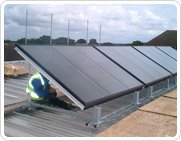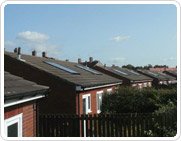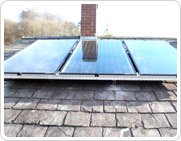Both landlords and tenants will benefit from solar hot water and electric systems, and solar install will assist throughout the installation process, from the start when the initial site visit takes place, to explanatory presentations, helping you make key decisions, quotations, providing information on grant funding, installation and user training and maintenance.
 The procedure of installing solar energy systems can be confusing to clients and usually they are unsure of where to start or if solar energy would even be beneficial to them, to help our clients with these concerns we will provide any advice, help or assistance during the process of switching to solar renewable energy.
The procedure of installing solar energy systems can be confusing to clients and usually they are unsure of where to start or if solar energy would even be beneficial to them, to help our clients with these concerns we will provide any advice, help or assistance during the process of switching to solar renewable energy.
The procedure of installing solar renewable energy is the same in both new and old buildings up and down the country, whether you’re looking for solar panels in Bournemouth, solar panels Ipswich or solar panels Inverness. The systems can be easily integrated into buildings of any age, any location, and to meet your requirements we will always work hard to provide the best solution.
A solar hot water system installed into a tenants house or flat will reduce carbon emissions as well as their gas bills, and this will be most beneficial in the summer months when the boiler can be turned off, as hot water will be generated by their solar system.
There are long-term benefits to using solar energy systems, as well as saving money and energy, a solar hot water system will reduce the wear and tear on systems such as boilers, which will reduce how often they need to be serviced because they are doing less work.
 By installing solar energy systems into your property will mean reduced bills – which will keep your tenants happy, whilst creating a sustainable future for both tenant and landlord through reducing carbon emissions.
By installing solar energy systems into your property will mean reduced bills – which will keep your tenants happy, whilst creating a sustainable future for both tenant and landlord through reducing carbon emissions.
There are two types of solar energy systems:
- Solar electric systems – which generate electricity
- Solar hot water systems – which generate hot water
Both of these solar energy systems will fit into most buildings including community centres, care homes, sheltered housing units and large flats buildings. Solar energy is easy to install into most existing buildings with little disruption and this means any services carried out by the building can continue as usual whilst the work it complete.
If your building consumes a high level of electricity then it would benefit from installing a solar electric system, on the other hand, if it uses high levels of water, the building would benefit from a solar hot water system. The solar hot water system works by using the energy of the sun, when the sun is out, water is pumped around the solar panels on your roof and is heated by the suns rays harnessed by the panel, the hot water then flows into the building, warming the water stored in your hot water store, or cylinder.
 The solar hot water system will be beneficial whether it is put in place in a large care home or single house, they will result in substantial savings in energy, carbon and money and are a good starting point when you start to consider the prospects of solar energy in your property.
The solar hot water system will be beneficial whether it is put in place in a large care home or single house, they will result in substantial savings in energy, carbon and money and are a good starting point when you start to consider the prospects of solar energy in your property.
The solar electric systems work by being integrated into a buildings electrical system, and this then will provide electricity directly into the distribution system. These systems are made up of panels that are mounted onto the roof of the building and are controlled by switches that will be inside the building. The solar electric panels work by capturing the suns energy, and this energy is then channeled into the main ring and into appliances that are used in the building.
The process of fitting a solar electric system means you will reduce the energy that is drawn from the national grid, and when the system is not producing energy your home will still be able to draw from the national grid, the solar electric system saves money on your bills as well as reducing the amount of CO2 your home will generate.
